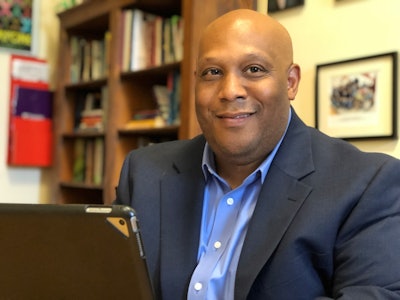Understanding the racialized police killing of George Floyd in Minneapolis and the ongoing national protests that have followed in its wake, is evidence for why colleges and universities need research centers to study and examine race and equity issues not only on our campuses, but in society in general.
University of Southern California’s Race and Equity Center led by Dr. Shaun Harper is perhaps the most visible and productive center in the nation, regularly churning out thought-provoking analyses and providing critical training through its Equity Institutes to higher education administrators who undoubtedly will have to address the Floyd killing and the spate of other shootings of unarmed Black men and women when students eventually return to their colleges campuses post COVID-19.
Now, the USC Race and Equity Center is preparing to expand and broaden its focus and work.
 Dr. Jamal Watson
Dr. Jamal WatsonOn Monday, Dr. Estela Bensimon—arguably one of the nation’s most prominent and prolific educational scholars—announced her retirement from USC and the merging of the Center for Urban Education (CUE) that she founded in 2000 with Harper’s Race and Equity Center. The merger will serve as a game changer for diversity, inclusion and equity work across the higher education landscape.
“I couldn’t have done it with anyone else,” says Bensimon about working with Harper. “I trust him, and I know that he will actually honor and protect the legacy of the center. I am lucky for this. Otherwise, I would have had to close it down.”
Thankfully, that won’t be the case.
When it comes to equity-minded work, Bensimon was a pioneer long before the term became trendy.
For 20 years, CUE—which was created from a $900,000 grant given to Bensimon in 2000 from the office of the provost—has emerged as a national model, focused on outcomes for racial minoritized students by pushing practitioners to examine their own practices through the lens of racial equity. In doing so, the center has become known for helping faculty, staff and school leaders change their own practices and mindsets.
“When I started this work, we received a lot of pushback on our agenda for racial equity,” says Bensimon, a past present of the Association for the Study of Higher Education. “Now, lots of people talk about equity, although it pains me because often, they talk about it in ways that reflect their understanding of racism and racial equity is about doing anti-racist work.”
CUE tailored their equity work to the needs of institutions—large and small—and received financial support across the years from the Ford Foundation, Teagle Foundation and the Bill and Melinda Gates Foundation.
“We are a high touch organization,” says Bensimon in an interview with me late last week. “We knew that our work was useful and valuable because colleges pay us to use our tools.”
Harper met Bensimon through her scholarship long before the two actually met in person.
“I was a graduate student and I was assigned a lot of her work in my program and it was so clear to me in the late 1990s that this person was a genius,” says Harper, who was an assistant professor of clinical education from 2003-05 and returned in 2017 to start the Race and Equity Center after founding the Center for Study of Race and Equity in Higher Education at the University of Pennsylvania. “I wanted to know her. I admired her brilliance from afar the more and more I read her work.”
Over the years, the two became good friends and have collaborated on a number of research projects.
“So much good that has been done here in the USC Rossier School of Education over the past 25 years that has been led by Estela,” says Harper. “Her retirement from our faculty is going to create a void that I don’t think can ever be filled. Instead, what we should do for those of us who remain here, is work as hard as we can to sustain her influence and her legacy. But there will never be another Estela Bensimon here or anywhere else.”
Bensimon is retiring from USC, but not from her research. She’s starting a consulting firm and will continue to write and research about pressing racial inequities. On Monday, scholars and friends tuned in virtually from across the world to pay homage to a scholar who helped higher education understand that simply talking about diversity is not enough, particularly during times of racial unrest.
“There are a lot of centers that make outrageous claims about the reach and the impact of their work,” says Harper in a recent interview. “CUE is the real deal. They have transformed so many colleges and universities. The work is not flashy, but it is real.”
USC is lucky. Bensimon’s pioneering work will continue and expand under Harper’s influence.
“I am grateful that she has entrusted her legacy, her brand, her staff to me,” he says. “We’re going to do right by her.”
Dr. Jamal Watson is the Editor-At-Large at Diverse. You can reach him at [email protected] and follow him on Twitter @jamalericwatson



















